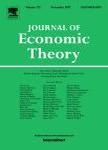-
作者:Neeman, Z; Orosel, GO
作者单位:Boston University; University of Vienna
摘要:We present a model of social learning in an environment with common values where informational cascades and herding arise in combination with the winner's curse. A seller of an object sequentially obtains bids from potential buyers. We characterize three classes of equilibria that differ widely in their information aggregation properties and in the size of the rent the seller captures from the buyers. We compare the procedure of sequentially soliciting bids from the buyers to conducting an Eng...
-
作者:Balinski, M; Sönmez, T
作者单位:Centre National de la Recherche Scientifique (CNRS); Institut Polytechnique de Paris; Ecole Polytechnique; University of Michigan System; University of Michigan
摘要:A new class of matching problems that models centralized college admissions via standardized tests is presented. The allocation mechanism that is used in real-life applications of this problem in Turkey is analyzed. It is shown that this mechanism, multi-category serial dictatorship, has a number of serious deficiencies, most notably inefficiency, vulnerability to manipulation, and the potential of penalizing students for improved test scores. Exploiting the relation between this class of prob...
-
作者:Krasa, S
作者单位:University of Illinois System; University of Illinois Urbana-Champaign; University of Vienna
摘要:The paper considers an exchange economy with incomplete information in-which agents can retrade goods until all gains From trade are exhausted. Unimprovable allocations are defined to be those allocations from which agents would not wish to deviate either by retrading goods or by revealing further Information. The concept of unimprovability is then used to analyze a lemons market and an adverse selection insurance marker in which agents can renegotiate after information has been revealed. Fina...
-
作者:Watson, J
作者单位:University of California System; University of California San Diego
摘要:This paper develops a model of a long-term partnership with two-sided incomplete information. The partners jointly determine the stakes of their relationship and individually decide whether to cooperate with or betray each other over time. An equilibrium in which the partners start small is studied and shown to be uniquely selected by a strong renegotiation condition. The characterization offers new insights into how relationships change as parties learn about each other and qualitative differ...
